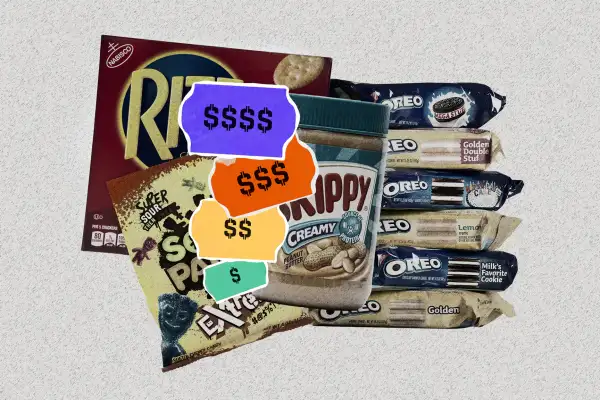From Oreos to Sour Patch Kids, a Bunch of Your Favorite Snacks Are Getting More Expensive

Getting hold of popular snacks — from Oreos and Ritz crackers to Slim Jims and Gatorade — will start to cost you more than usual.
Major food companies have been warning of higher costs due to the global supply chain disruption that is causing shortages and price hikes across industries. From labor shortages to shrinking space on shipping containers, companies are struggling to get items produced, transported, stored and onto the shelves. When they do get on store shelves, inflation is making them pricier than before.
Just this week, Mondelez International, which makes snacks like Oreos, Sour Patch Kids and Chips Ahoy!, warned of its plans to raise U.S. prices by as much as 7% starting in January 2022.
In general, food prices rose 0.9% in September and are up 4.6% over the past 12 months, according to the U.S. Bureau of Labor Statistics.
Here are some of your favorite brands that you may have to pay more for to snack on.
Oreo, Chips Ahoy!, Sour Patch Kids
Mondelez expects to see costs increase next year because of higher commodity prices and transportation shortages, CEO Dirk Van de Put said on CNBC’s “Closing Bell" Tuesday. It's been difficult to keep retailers stocked with items, and on-shelf inventory is “nowhere near where we would like it to be,” he added.
The food giant made headlines earlier this year when workers at Nabisco, which is owned by Mondelez and makes products like Teddy Grahams and Fig Newtons, went on strike following unsuccessful contract negotiations. The strikers called for a boycott of Nabisco products made in Mexico, and even got the support of actor Danny DeVito.
Slim Jim, Reddi-wip
In October, the major food producer Conagra — which owns brands including Slim Jims, Reddi-wip, Pam and Orville Redenbacher' popcorn — said it would raise prices to deal with higher inflation.
The company is grappling with increased costs of ingredients including oils, proteins and grains, requiring it to hike up prices on frozen goods by 3.5% and on staple meals by 3.3%, Reuters reported.
Gatorade, Pepsi, Doritos
PepsiCo — the parent company of brands like Gatorade and Pepsi and snacks like Lay's and Doritos — is expecting more price hikes. The company said back in July that it planned to pass higher costs along to customers as it dealt with inflation, and now it's warning prices could increase again.
"I expect we’ll probably see a little bit more pricing increases in the first quarter of next year as we deal with the fact that input costs are just higher", PepsiCo chief financial officer Hugh Johnston said on CNBC’s “Squawk Box" in October. "That’s just the reality for us and everybody else.”
Ben & Jerry's, Lipton, Klondike
Unilever has also been hit by inflationary pressure.
The company with brands like Ben & Jerry's and Lipton warned last month that it would likely have to raise prices.
"We expect inflation could be higher next year than this year," Graeme Pitkethly, Unilever's chief financial officer, said on a call with reporters.
Häagen-Dazs, Chex, Nature Valley
From Annie's mac 'n' cheese to Häagen-Dazs ice cream and Bugles, General Mills owns a lot of the brands you might find in your pantry.
The company is struggling with supply chain disruptions that are making it hard to fill customer orders, and it's been forced to raise prices in nearly all of its grocery stores.
“Our prices are going to go up for the remainder of the year as we see inflation going up,” the General Mills CEO said in September, according to The Wall Street Journal.
Skippy, Corn Nuts
Hormel, the company that recently bought the Planters snack brand, raised prices on some products like Skippy peanut butter back in February.
Since then, the company’s costs have continued to rise.
"We saw significant inflationary pressure in almost all areas of our business, including raw materials, packaging, freight, labor and many other inputs during the quarter," CEO Jim Snee said in a statement alongside the company’s recent third-quarter earnings. "We have implemented pricing actions across virtually every brand, which has been our main lever to offset these inflationary pressures."
More from Money:
Holiday Shortages! Toys, Turkeys, Christmas Trees and (Gulp) Wine Could All Be Hard to Come by
Expect to Pay $100 More for a TV This Holiday Season (Even With a Deal)
From Dresses to Dog Food, Here Are 8 Essentials Inflation Is Making More Expensive

